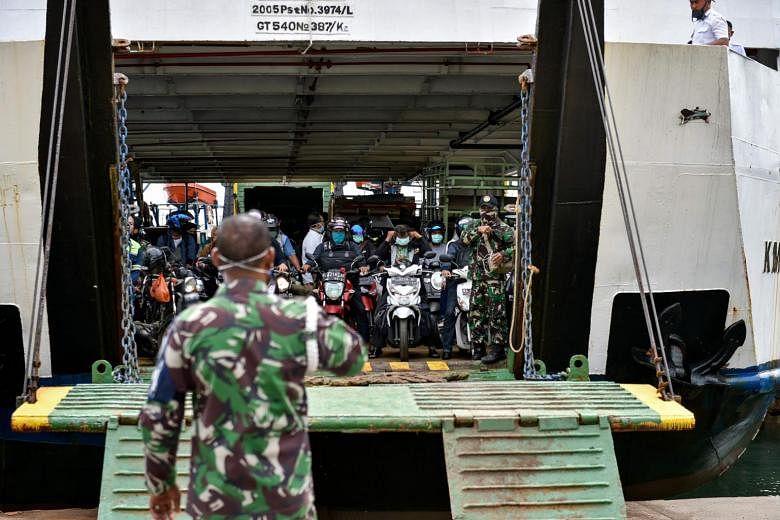JAKARTA - On April 7, the same day Jakarta shuttered its schools and non-essential businesses and told its residents to stay home, the ferry KM Dorolonda steamed into the port city of Baubau, in South-east Sulawesi province in Indonesia's far east.
On board the 146m vessel were 621 passengers readying to disembark in the province's second largest city.
It was a journey like many others across Indonesia. State-owned ferries are lifelines for some of the country's 6,000 or so inhabited islands, and the vessels are often packed with people and goods. The Dorolonda itself regularly plied a 2,400km route calling seven ports including Namlea and Ambon in Maluku.
This journey, though, was different. It has come to symbolise the cost of moving too slowly to curb the pandemic in a country as vast and under-resourced as Indonesia.
It also shows how major transport links have spread the coronavirus and only now are officials getting a clearer picture.
Some of those who arrived on April 7 had boarded in Surabaya in East Java and Makassar in South Sulawesi, but most were from Jakarta, where the trip started - 1,755km to the west as the crow flies - and where the outbreak had been spreading for more than a month.
The Dorolonda then left Baubau, stopping at several more ports before reaching Ternate, North Maluku, more than 860km to the north-east, over a week later.
On April 17, a total of 19 crew members tested positive for Covid-19 and were quarantined in Ternate. So, too, was the Dorolonda.
Barred from taking passengers, it later steamed back to Jakarta, where it is still moored off the port of Tanjung Priok.
In Baubau the damage was done. The Dorolonda's 621 passengers had scattered. Some stayed in the city, but more than two-thirds of the passengers travelled into the countryside or to the capital, Kendari, 220km to the north. Still others landed on the surrounding islands, including those of the Wakatobi district 150km to the east.
Locating, testing and then processing samples collected from the passengers took a month, and only now are officials getting an idea of how many infections have occurred because of that voyage.
On May 13, after the nearest laboratory in Makassar, 330km away, finally churned through the test backlog, news arrived that South-east Sulawesi's known cases of coronavirus would spike. Over two days the caseload would more than double to 183, with most linked to the Dorolonda.
President Joko Widodo had barred non-essential travel out of Jakarta on April 24, but by then ferries like the Dorolonda had likely pushed the virus to the farthest reaches of the archipelago.
All inter-island ferry services have been suspended until June.
Dr Pandu Riono, an infectious diseases expert at University of Indonesia, said data gleaned from Facebook suggests 1.7 million people left the greater Jakarta region between April 5 and May 1.
Dr Laode Rabiulawal, a spokesman for South-east Sulawesi's Covid-19 task force, says Jakarta's lockdown needs to stay in force to buy his province time to contain the outbreak, which now stands at 202 cases.
"To get control of this pandemic quickly we have to extend the lockdown of Jakarta and social distancing restrictions," Dr Laode said.
But already there are signs that Jakarta residents are chaffing at the restrictions, which were extended again last week. Images of bustling markets filled with mask-less shoppers and busy airports despite the ban on non-essential travel have flooded social media.

And cases of Covid-19 outside Jakarta are growing. But the spike in the number of infections, at least in part, stems from Indonesia's improved ability to find them.
The country has taken delivery of high volume polymerase chain reaction (PCR) machines and retooled tuberculosis testing equipment it already had to expand its testing capacity. During the first three weeks of May, testing has more than doubled to 230,000 since the outbreak began. The country's first cases were detected on March 2.
Back in Baubau, which will begin using such a PCR machine this week, Dr Laode said 30 patients have needed to be hospitalised, overwhelming the 16 beds it had readied for Covid-19 cases. Officials are adding another 26 beds, he said.
In Jakarta, where the number of new cases is slowing, it's the opposite story. Roughly half the beds in the nine hospitals set aside for Covid-19 patients are empty.
"It's good news," Dr Pandu said. "But after Ramadan, all those cases may come back to Jakarta."
Correction note: In an earlier version of the article, we referred to the capital of South-east Sulawesi as Kendana. It should be Kendari . We are sorry for the error.












